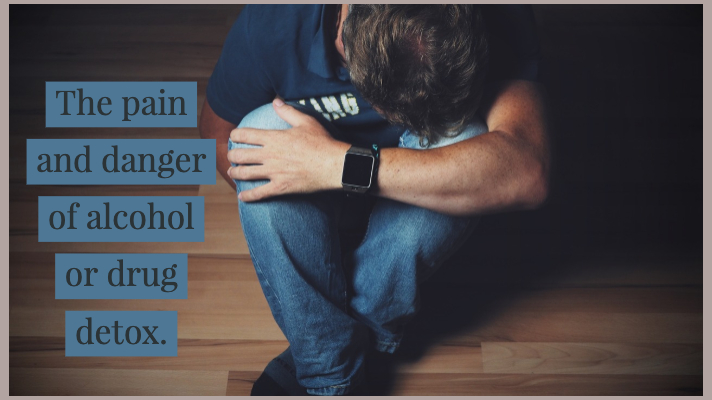Drug and Alcohol Detox is the first step in overcoming an addiction to drugs. Some people need a medically assisted detoxification. Others don’t need a medically assisted detoxification.
What are the factors to consider for a drug or alcohol detox?
It depends on which drug or substance you have been abusing. You also have to take into account how long you have been using the drug and the quantity of the substance you have been using. These factors will determine whether medical or non-medical assisted detoxification is needed prior to treatment commencement. If you don’t have any medical training, be on the safe side and see a professional.
How long will it take?
Drug and Alcohol Detoxification is usually between 4 and 10 days depending on the patient’s needs.
Dangers of Drug and Alcohol Detox
Some substances have very serious detox symptoms. It’s important to look for a treatment center that has a detox program. That’s because it is an important first step toward recovery from substance abuse. There are different time frames for treatment.
It used to be 28 days. That was an arbitrary number of days based on insurance practices. Now, we see the most success happening when the treatment stay is 90 days. Though rehabilitation programs are frequently 30 to 90 days long, the first part of all of them is can be a detox.
Sometimes the process will take place at another facility. During this time, a medical professional or maybe even a nurse helps you manage the symptoms of withdrawal that occur when you stop taking drugs or alcohol.
Combination of Detox and other Treatment
Often rehab programs combine detox with weeks or months of therapy, classes, and recovery. However, longer programs are not practical for everyone. They take time and money. For those who have a job or children to take care of, a short detox program may be the most option.
Is a Detox Only Progam an option?
Yes, but we wouldn’t recommend it.
The biggest reason to choose detox only is insurance restriction or lifestyle barriers. Rehab programs can cost a lot. Even with good insurance, you might have a high deductible or co-pay. By having the only detox in a medically supervised environment, you may be able to keep the cost of your recovery down.
Another factor in choosing a short detox program is your family life. If you are a parent, it may be difficult to stay away from your kids for months. It is easier to explain your absence for a few days rather than a few months. If you have a job, it may be impossible for you to enter a lengthy rehab program. Rather, you can detox with the help of a quality facility and then use outpatient services to help you maintain your sobriety.
What Determines the Length of stay?
There are a few things that will determine the length of detox you will need. One is the type of drug you use. Some drugs will clear out of your body faster than others. Opiates and Heroin usually take about a week to clear from the body.
However, if you use a rapid detox program, you may be able to stay for only three days. Note: this “rapid process” is new and a bit controversial. During fast detox, you are put under anesthesia and treated to remove heroin from your body so that when you wake up you will no longer be physically addicted to the drug.
Rapid detox is not possible for all types of drugs. As we mentioned, it is also a new procedure. Many medical professionals have serious concerns about this method.
Do all drugs have withdrawal symptoms?
Some drugs, such as LSD, do not have withdrawal side effects. In those cases, shorter programs combined with counseling and therapy may be enough. For the most part, you will not want to leave the detox program until you feel that you have your act together. We advise everyone we work with to strictly take the advice of the doctors and therapists. Making your own choices is what got you here. Give the experts a chance to offer you a new way of life.
Longer detox treatment may be able to provide a counseling line to help you move from the detox program to your normal life
What happens during drug and alcohol detox?
While you are at the detox center, your body will go through some physical withdrawal. The symptoms will depend on what kind of drug you have been taking. Some drugs, such as heroin and opiates, can be replaced with other drugs during detox. This is a more comfortable way to detox, but you will still be dependent on the prescription drug at the end.
This is a short-term fix. Some people call us and tell us they have been on a Methadone “maintenance” program for several years. That is not maintenance — it’s drug addiction. Suboxone is another withdrawal medication. It is not meant to be taken for a long period of time. At some point, you will also detox from the prescription drug. However, these medications to make it easier than detoxing from heroin or an opiate. Alcohol withdrawal is very dangerous. Many people do not realize that the risk of seizure is high.
I’m scared – will I be made comfortable?
Yes, you will be made comfortable. It’s normal to be scared. During detox, you will have full access to medical care. This includes skilled professionals and nursing staff. You will be seen by a doctor who can provide the appropriate medication to combat some of your withdrawal symptoms. This can be an intense process. Some people experience very upsetting or strong emotions during this time. This is enhanced by the fact that, in the past, you may have used drugs or alcohol to help you handle strong emotions. In detox, you will be able to talk to a therapist who will help you manage your emotions. You will also learn to live life “on life’s terms”.
What Are the Treatment Options When Detox Is Over?
In our experience, it’s best to detox first, then go to a treatment center. It’s very important to continue an on-going treatment plan. It is very difficult to stay clean and sober after detox without any ongoing support.
The good news, there are many different types of support available. Give us a call, we are able to refer you to an inpatient or outpatient rehab program. It’s not ideal, but if your life is constrained, consider attending the outpatient program for a few hours a day but still go to your home and work in between.
There are so many options for recovery support
You can also participate in support groups, which you can find through our site, Alcoholics Anonymous, your Church or you Community. Some people find it easier to move to a sober living place. Living in a structured, drug and alcohol-free place can be very helpful for keeping your sobriety. Some find it easiest to work with a counselor or therapist. This may give you the setting you need.
Frankly, we have seen the most success with a 30-90 day inpatient program. It’s time to get help. Band-aid approaches tend to just provide a temporary fix. It’s possible to have a lifetime of recovery,
